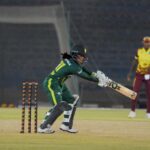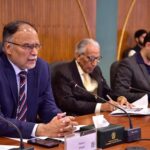UNITED NATIONS, Apr 05 (APP):Ukrainian President Volodymyr Zelenskyy addressed the United Nations Security Council on Tuesday as Russia faces growing condemnation over alleged atrocities in the town of Bucha.
The Ukrainian president urged the U.N. to take action, saying that the Russian military must be held accountable for war crimes in Bucha and elsewhere in the country.
“Now the world can see what Russian military did in Bucha, but the world has yet to see what they have done in other occupied cities and regions of our country,” Zelenskyy said.
His remarks came after he said at least 300 people had been “killed and tortured” by Russian forces in Bucha, near Kyiv, before troops pulled out of the besieged town.
Photos and videos purporting to show dead bodies strewn on city streets have sparked international condemnation against Moscow, with US President Joe Biden on Monday accusing Vladimir Putin of war crimes and calling for a trial.
Russia’s UN Ambassador Vasily Alekseevich Nebenzya denied Ukrainian allegations that it had killed civilians in Bucha, describing footage and photographs of dead bodies as a “provocation” and a “staged performance” by Kyiv.
UN Secretary-General Antonio Guterres added his voice to the international calls for a war crimes investigation into the killing of civilians in the Ukrainian town of Bucha.
The secretary-general told the 15-member Council that an independent probe was needed to guarantee effective accountability.
Guterres described the Ukraine crisis, which was prompted by Russia’s “fully-fledged invasion” of its neighbour, as “one of the greatest challenges ever to the international order and the global peace architecture, founded on the United Nations Charter”.
To date, the Russian offensive has displaced more than 10 million people in just one month, the fastest forced population movement since the Second World War, Mr. Guterres said.
Of that number, more than 4.2 million have fled Ukraine’s borders, according to the UN refugee agency, UNHCR, amid ongoing shelling and use of indiscriminate weapons that have seen 86 health and medical facilities attacked from 24 February to 2 April, the World Health Organization said.
Given the urgency of the situation, the UN chief explained that he had tasked the UN’s Emergency Relief Coordinator, Martin Griffiths, to travel to Russia and Ukraine to press for an urgent humanitarian ceasefire.
In Geneva, where UN rights chief Michelle Bachelet has condemned the events at Bucha and spoken of possible war crimes, her Office explained that the episode marked a new low in the war, with victims’ bodies desecrated in death.
“What we have seen emerging in Bucha and other areas, clearly points to a very disturbing development…all the signs are that the victims were directly targeted and directly killed,” said Liz Throssell, spokesperson for the Office of the High Commissioner for Human Rights (OHCHR).
Before the events in Bucha came to light, the UN rights office had already described indiscriminate shelling and bombardment as likely war crimes.
“You could argue there was a military context for example to a building being hit (but) it’s hard to see what was the military context of an individual lying in the street with a bullet to the head, or having their body burned,” Ms. Throssell told journalists.
Addressing the Russian claim that the images from Bucha were faked, Ms. Throssell explained that human rights investigators followed painstaking forensic procedures, to ensure the veracity of any video or photographs emerging from scenes of possible war crimes.
“It’s looking to get the name of the civilian casualty, the date if possible of when the person died, and how they died and that might help with the attribution of who might have killed them,” she said, adding that no determination had yet been made about whether a war crime had been committed.
“We are not saying that this specific incident is a war crime, we can’t establish that yet, that is why there needs to be detailed forensic examination…Justice and accountability take time; what is important is that this work is undertaken and continues to ensure accountability going forward.”
Soon after Russian’s invasion of Ukraine, top rights investigators were appointed by the Human Rights Council in Geneva.
The mandate of the International Commission of Inquiry on Ukraine includes gathering testimonies and evidence from survivors of grave rights abuses, but is not a judicial body and cannot rule on war crimes.
A separate inquiry by the International Criminal Court (ICC) into alleged grave breaches on the Geneva Convention is also under way, at the request of 39 ICC Member States, days after Russian troops invaded Ukraine on 24 February.
Back in the Security Council, Mr. Guterres added that beyond Ukraine’s borders and particularly in developing nations, the disruption to global supply chains caused by the war has prompted massive price hikes for food, energy and fertilizers, as Russia and Ukraine are major global producers.
“In the past month alone, wheat prices have increased by 22 per cent, maize by 21 per cent and barley by 31 per cent,” the Secretary-General said, before noting with concern that 74 developing countries with a total population of 1.2 billion people were “particularly vulnerable” to spiking food, energy and fertilizer costs.
The UN chief also warned that debt repayments now account for 16 per cent of developing countries’ export earnings, while the burden is twice as high for small island developing states, because of increased interest rates and expensive imports.
UNITED NATIONS, Apr 05 (APP):Ukrainian President Volodymyr Zelenskyy addressed the United Nations Security Council on Tuesday as Russia faces growing condemnation over alleged atrocities in the town of Bucha.
The Ukrainian president urged the U.N. to take action, saying that the Russian military must be held accountable for war crimes in Bucha and elsewhere in the country.
“Now the world can see what Russian military did in Bucha, but the world has yet to see what they have done in other occupied cities and regions of our country,” Zelenskyy said.
His remarks came after he said at least 300 people had been “killed and tortured” by Russian forces in Bucha, near Kyiv, before troops pulled out of the besieged town.
Photos and videos purporting to show dead bodies strewn on city streets have sparked international condemnation against Moscow, with US President Joe Biden on Monday accusing Vladimir Putin of war crimes and calling for a trial.
Russia’s UN Ambassador Vasily Alekseevich Nebenzya denied Ukrainian allegations that it had killed civilians in Bucha, describing footage and photographs of dead bodies as a “provocation” and a “staged performance” by Kyiv.
UN Secretary-General Antonio Guterres added his voice to the international calls for a war crimes investigation into the killing of civilians in the Ukrainian town of Bucha.
The secretary-general told the 15-member Council that an independent probe was needed to guarantee effective accountability.
Guterres described the Ukraine crisis, which was prompted by Russia’s “fully-fledged invasion” of its neighbour, as “one of the greatest challenges ever to the international order and the global peace architecture, founded on the United Nations Charter”.
To date, the Russian offensive has displaced more than 10 million people in just one month, the fastest forced population movement since the Second World War, Mr. Guterres said.
Of that number, more than 4.2 million have fled Ukraine’s borders, according to the UN refugee agency, UNHCR, amid ongoing shelling and use of indiscriminate weapons that have seen 86 health and medical facilities attacked from 24 February to 2 April, the World Health Organization said.
Given the urgency of the situation, the UN chief explained that he had tasked the UN’s Emergency Relief Coordinator, Martin Griffiths, to travel to Russia and Ukraine to press for an urgent humanitarian ceasefire.
In Geneva, where UN rights chief Michelle Bachelet has condemned the events at Bucha and spoken of possible war crimes, her Office explained that the episode marked a new low in the war, with victims’ bodies desecrated in death.
“What we have seen emerging in Bucha and other areas, clearly points to a very disturbing development…all the signs are that the victims were directly targeted and directly killed,” said Liz Throssell, spokesperson for the Office of the High Commissioner for Human Rights (OHCHR).
Before the events in Bucha came to light, the UN rights office had already described indiscriminate shelling and bombardment as likely war crimes.
“You could argue there was a military context for example to a building being hit (but) it’s hard to see what was the military context of an individual lying in the street with a bullet to the head, or having their body burned,” Ms. Throssell told journalists.
Addressing the Russian claim that the images from Bucha were faked, Ms. Throssell explained that human rights investigators followed painstaking forensic procedures, to ensure the veracity of any video or photographs emerging from scenes of possible war crimes.
“It’s looking to get the name of the civilian casualty, the date if possible of when the person died, and how they died and that might help with the attribution of who might have killed them,” she said, adding that no determination had yet been made about whether a war crime had been committed.
“We are not saying that this specific incident is a war crime, we can’t establish that yet, that is why there needs to be detailed forensic examination…Justice and accountability take time; what is important is that this work is undertaken and continues to ensure accountability going forward.”
Soon after Russian’s invasion of Ukraine, top rights investigators were appointed by the Human Rights Council in Geneva.
The mandate of the International Commission of Inquiry on Ukraine includes gathering testimonies and evidence from survivors of grave rights abuses, but is not a judicial body and cannot rule on war crimes.
A separate inquiry by the International Criminal Court (ICC) into alleged grave breaches on the Geneva Convention is also under way, at the request of 39 ICC Member States, days after Russian troops invaded Ukraine on 24 February.
Back in the Security Council, Mr. Guterres added that beyond Ukraine’s borders and particularly in developing nations, the disruption to global supply chains caused by the war has prompted massive price hikes for food, energy and fertilizers, as Russia and Ukraine are major global producers.
“In the past month alone, wheat prices have increased by 22 per cent, maize by 21 per cent and barley by 31 per cent,” the Secretary-General said, before noting with concern that 74 developing countries with a total population of 1.2 billion people were “particularly vulnerable” to spiking food, energy and fertilizer costs.
The UN chief also warned that debt repayments now account for 16 per cent of developing countries’ export earnings, while the burden is twice as high for small island developing states, because of increased interest rates and expensive imports.






